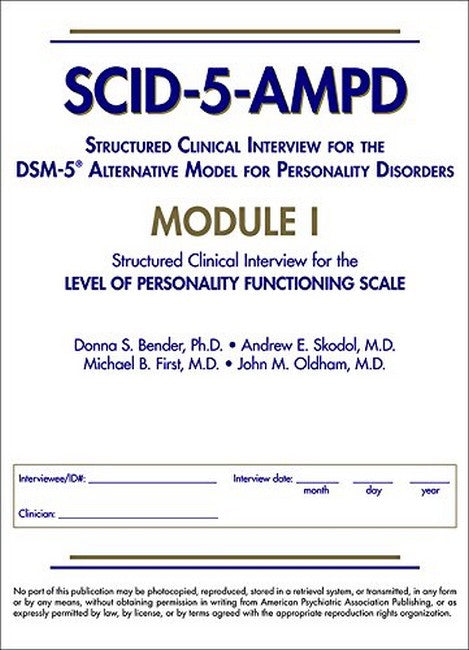The Structured Clinical Interview for the DSM-5 Alternative Model for Personality Disorders (SCID-5-AMPD) meets a timely need. The Alternative Model for Personality Disorders in DSM-5 has ushered in a consensus and an upswing in research that has shifted from a categorical diagnosis of personality disorders toward a dimensional approach. Before now, no interview-based procedure has been available for applying the Alternative Model. Expertly designed, the Structured Clinical Interview for the DSM-5 Alternative Model for Personality Disorders (SCID-5-AMPD) is a semistructured diagnostic interview that guides clear assessment of the defining components of personality pathology as presented in the DSM-5 Alternative Model. The modular format of the SCID-5-AMPD allows the researcher or clinician to focus on those aspects of the Alternative Model of most interest. Module I: Structured Clinical Interview for the Level of Personality Functioning Scale is devoted to the linchpin of dimensional assessment -- self and interpersonal functioning -- using the Level of Personality Functioning Scale. Module I provides both a global functioning score and an innovative, detailed assessment of all four domains of functioning (Identity, Self-Direction, Empathy, and Intimacy) and their corresponding subdomains. Module I can be used independently or in combination with any of the following SCID-5-AMPD modules: Module II dimensionally assesses the five pathological personality trait domains and their corresponding 25 trait facets. Module III comprehensively assesses each of the six specific personality disorders of the Alternative Model, as well as Personality Disorder--Trait-Specified. Also available is the User's Guide for the SCID-5-AMPD: the essential tool for the effective use of any SCID-5-AMPD module. This companion guide provides instructions for each SCID-5-AMPD module and features completed samples of all modules in full, with corresponding sample patient cases and commentary. Trained clinicians with a basic knowledge of the concepts of personality and personality psychopathology will benefit from the myriad applications and insights offered by the SCID-5-AMPD.

